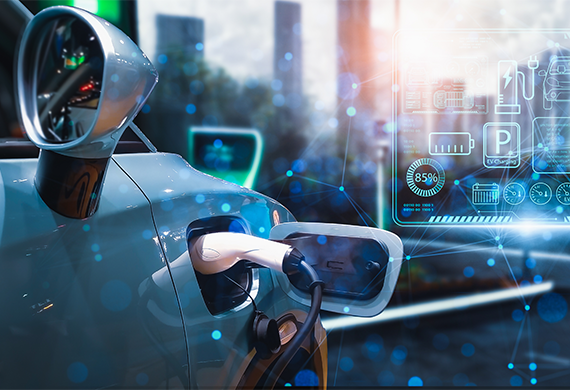The Business Costs of Running an Electric Car vs a Petrol Car
Despite the cost-of-living crisis, electric cars could be a cheaper option for your business above diesel and petrol alternatives.
In fact, electric cars might be the ideal money-saving option for your organisation’s mobility needs. They offer many benefits, from future-proofing your organisation to advancing your Environmental, Social and Governance (ESG) reputation.
By transitioning to electric, you could also make significant cost reductions for your business. We explore these advantages across this guide so you can adjust your mobility strategy as you see fit.
Petrol vs electric car: A business cost comparison
According to the UK government’s advisory fuel rates:
- The cost of running an electric car is nine pence per mile (as of March 2023).
- The cost of running a petrol car is 21 pence per mile.
Where you live, what you pay for electricity and fuel plus the vehicle you own could decrease or increase the above costs.
Battery size, vehicle efficiency and a driver’s performance behind the wheel are also varying factors to the overall cost per mile.
Ways to keep electric cars charged
There are three main ways to charge your electric car – at home, or using public or workplace charging points.
1. At work
You can install charging points at your business premises, with the cost for installation typically around £700-£1,000. You’ll then need to set a charging policy for your staff members to follow, which can include the following:
- Offer a staff incentive with free charging during the workday.
- Charge employees for their individual charging times.
- Offer a time-based tariff encouraging charge point sharing between employees.
- Offer free charging for set time periods, followed by a fee after the allotted time.
The charging costs for your organisation will depend upon the electricity tariff you have, the type of chargers you’ve installed, and the models of cars being charged.
You can buy lower price chargers with speeds of 7kWh. This’ll save your business money in the short-term, but in the long-term you may need to upgrade the units as electric car technology changes.
It’s important to have on-site charging software to keep track of your employees’ charging sessions. This’ll help you monitor total costs on a regular basis. With this data, you can adjust your charging policy accordingly.
Use government grants to lower electric car costs
To assist with introducing electric cars into your business, you can use government schemes for financial support. These include the following:
- EV Infrastructure Grant: This can cover up to 75% of the costs of buying and installing charge points. That’s a potential total of £850. You must meet the eligibility criteria for this scheme and can apply for free online. There’s a maximum limit of £15,000 per grant. The grant is for small and medium-sized businesses.
- Workplace Charging Scheme (WCS): A voucher-based scheme that provides financial support for the purchase and installation of electric vehicle charging points. Your business must meet the eligibility criteria to apply, but it can result in £350 discounts per socket (with a total of 40 across all sites per applicant, potentially saving you £14,000).
If you meet the eligibility criteria, you can use the EV Infrastructure Grant in combination with the Workplace Charging Scheme.
2. At home
Your business may want to install charging points at employee homes to assist with their electric car recharging.
A considerable benefit of home chargers is you can access off-peak energy tariffs. These are less expensive to use at night, making for an ideal low-cost charging strategy.
Installing a home charger will cost around £700-£1,000. After this investment, electricity costs are where you can start saving money compared to diesel and petrol cars. Some off-peak EV tariffs offer prices as low as 9.5p/kWh, meaning you could fully charge a 40kWh battery for just £3.80. In the popular Nissan Leaf, this would give around 150miles of range, at a cost of just 2.5p/mile.
Also, factor in the needs of your specific electric car.
Every model has different charging requirements. Some may require longer hours to charge. This means you should consider your electricity tariff carefully, as you’ll want to choose one with off-peak hours that match.
3. At public charge points
Public charge points are often available at car parks or supermarkets. Some of them are also free to use.
However, due to the increasing popularity of electric cars, the free to use charge points are becoming increasingly rare and the costs are now quite high—50 pence per kWh. At some public charge points, you’ll need to pay a one-off fee alongside the charging time you pay for.
Others even require a subscription.
While that may seem expensive, using public charge points is still a viable way to top up your electric car’s battery. Some networks provide a free app that helps you find public charge points near you. And for app-enabled charge points, some hosts set a tariff and you’ll be able to see upfront costs and make payments within the app.
An alternative option is to use EV charge cards. For example, the Fleetone REV is usable at over 4,000 charging locations across the UK. With this card, you can get charging costs in one invoice.
The costs of rapid chargers
Your business can also use rapid chargers, which are often found at motorway service stations.
Rapid charger sites sometimes have a tariff set by the operator. The average rapid charging unit will cost 73 pence per kWh.
That amounts to around £22 for a 30-minute charging time.
The cost-effective advantages of electric cars
There are other factors that make electric cars a wise business investment. This includes:
- Cheaper maintenance costs: Electric cars require less maintenance as they have fewer moving parts than traditional internal combustion engines. This means fewer parts deteriorate over time, meaning less need to repair the vehicle.
- Regenerative technology: Electric cars are built to limit wear and tear. Regenerative braking recharges the battery as the brakes transfer energy from the wheels to the battery. This provides some recharging and extends battery life.
- Free from emissions charges: All electric vehicles are exempt from Clean Air Zone (CAZ) and Ultra Low Emission Zone (ULEZ) charges.
- Improve your Environmental, Social and Governance status: Using EV vehicles contributes to any environmental targets set within your organisation. Having a stronger ESG policy enhances your company’s reputation as being environmentally conscious and caring about its impact on the earth’s future.
In short, the whole life cost modelling of electric cars is impressive. The UK government’s 2030 ban on the sale of diesel and petrol cars and vans also means your business will benefit from making the electric transition as soon as possible.
If you’d like any help or advice, our expert team are on hand. Get in touch here.


